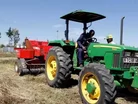John Deere taps tractor-hailing tech in bid to break ground in Africa

John Deere is teaming up with the “Uber of tractors” in Africa and betting on a future where farmers summon machines with the touch of a button.
It’s ride-hailing, farm style, reports Reuters. The world’s leading farm equipment maker is outfitting its tractors with startup Hello Tractor’s technology, which allows farmers to hail the machines via an app, monitors the vehicles’ movements and transmits usage information such as fuel levels.
The aim is to help the US company boost sales of it famous green and yellow John Deere tractors, a tough task in a continent with the world’s highest poverty rate and the least mechanized agricultural sector.
Deere is currently testing the technology - a small black box fitted beneath dashboards - on around 400 tractors in Ghana and Kenya. It told Reuters it plans to roll out the devices across Africa in the second half of this year, offering it to all contractors who buy its equipment on the continent.
Jacques Taylor, who heads John Deere’s sub-Saharan Africa business, said that the continent badly needs more machinery to develop its farming industry but most farmers don’t have the scale to justify a large investment.
“We would like to see that every farmer has access to mechanization,” he told Reuters. “The gap that we’ve identified is, how do we connect small farmers with tractor owners?”
Deere declined to comment on the investment costs for the rollout. The risks are clear; there is no certainty of any measure of success in Africa, which accounts for a tiny fraction of its global sales at present.
Held back by low incomes, tiny landholdings as well as a lack of bank financing, tractor numbers have long been stagnant on the continent, even as much of the developing world has experienced a boom in mechanisation.
Deere thinks it can help on the financing front: it told Reuters it could pull data from the Hello Tractor platform that showed in precise detail how farmers were using its equipment. That information, it said, could be used by the farmers - who typically lack credit histories - to help secure bank loans. This would mean they could buy more tractors.
Lotus opens new hypercar factory at Hethel base in Norfolk
BMW Group: harnessing green power from the pastures
Siemens Gamesa to build 250MW wind farm in Egypt
Read the latest issue of Manufacturing Global here
OPPORTUNITY KNOCKS?
In central Kenya, a Deere tractor zig-zagged across a sun-drenched field, raking up dry grass and dropping bales of hay. The black box monitored its every move.
The tractor belongs to Agrimech Africa, a Nairobi-based agricultural services firm that has taken up the offer to have the devices installed on its Deere machinery.
“They do the technology. We do the management,” said Pascal Kaumbutho, who heads the company. Agrimech, which is paid by farmers to work their land, hopes the new tech will help optimize its Deere tractors and connect them to new customers, allowing it to expand.
Kaumbutho, whose company manages a dozen tractors, envisions a future in which Agrimech runs a 1,000-strong fleet. “Right now, we’re reaching about 1,500 farmers,” he said. “Within the next two or three years, I’d like to reach 20,000.”
Such opportunities exist in markets across Africa, said Hello Tractor founder Jehiel Oliver, but companies like Deere have lacked the tools to develop them.
“Nigeria alone needs 750,000 (more) tractors to be on the global average,” he said. “Our technology is a market-maker for tractor manufacturers who want to sell into those markets.”
Deere’s annual revenue of about $40bn is dominated by the Americas and Europe. It doesn’t break out numbers for Africa, but combined revenue from Africa, Asia, Australia, New Zealand and the Middle East was $3.9bn last year.

